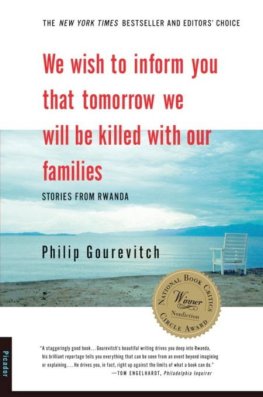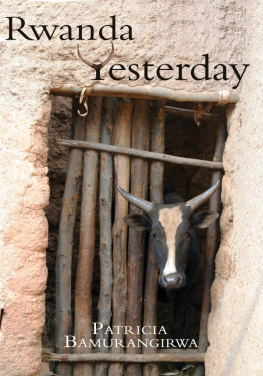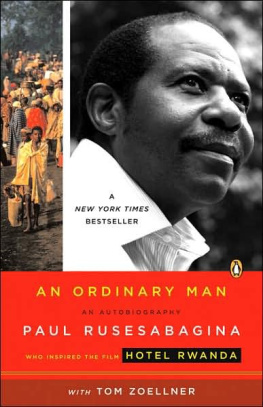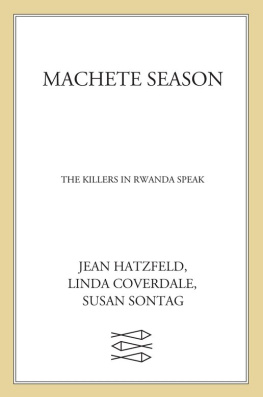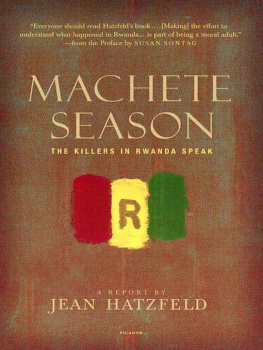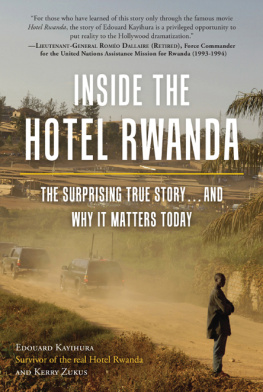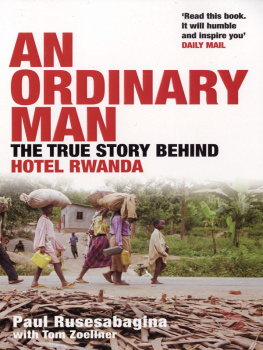Philip Gourevitch
WE WISH TO INFORM YOU THAT TOMORROW WE WILL BE KILLED WITH OUR FAMILIES
Stories from Rwanda


Leontius, the son of Aglaion, was coming up from the Peiraeus, close to the outer side of the north wall, when he saw some dead bodies lying near the executioner, and he felt a desire to look at them, and at the same time felt disgust at the thought, and tried to turn aside. For some time he fought with himself and put his hand over his eyes, but in the end the desire got the better of him, and opening his eyes wide with his fingers he ran forward to the bodies, saying, There you are, curse you, have your fill of the lovely spectacle.
PLATO,
The RepublicIN THE PROVINCE of Kibungo, in eastern Rwanda, in the swamp- and pastureland near the Tanzanian border, theres a rocky hill called Nyarubuye with a church where many Tutsis were slaughtered in mid-April of 1994. A year after the killing I went to Nyarubuye with two Canadian military officers. We flew in a United Nations helicopter, traveling low over the hills in the morning mists, with the banana trees like green starbursts dense over the slopes. The uncut grass blew back as we dropped into the center of the parish schoolyard. A lone soldier materialized with his Kalashnikov, and shook our hands with stiff, shy formality. The Canadians presented the paperwork for our visit, and I stepped up into the open doorway of a classroom.
At least fifty mostly decomposed cadavers covered the floor, wadded in clothing, their belongings strewn about and smashed. Macheted skulls had rolled here and there.
The dead looked like pictures of the dead. They did not smell. They did not buzz with flies. They had been killed thirteen months earlier, and they hadnt been moved. Skin stuck here and there over the bones, many of which lay scattered away from the bodies, dismembered by the killers, or by scavengersbirds, dogs, bugs. The more complete figures looked a lot like people, which they were once. A woman in a cloth wrap printed with flowers lay near the door. Her fleshless hip bones were high and her legs slightly spread, and a childs skeleton extended between them. Her torso was hollowed out. Her ribs and spinal column poked through the rotting cloth. Her head was tipped back and her mouth was open: a strange imagehalf agony, half repose.
I had never been among the dead before. What to do? Look? Yes. I wanted to see them, I suppose; I had come to see themthe dead had been left unburied at Nyarubuye for memorial purposesand there they were, so intimately exposed. I didnt need to see them. I already knew, and believed, what had happened in Rwanda. Yet looking at the buildings and the bodies, and hearing the silence of the place, with the grand Italianate basilica standing there deserted, and beds of exquisite, decadent, death-fertilized flowers blooming over the corpses, it was still strangely unimaginable. I mean one still had to imagine it.
Those dead Rwandans will be with me forever, I expect. That was why I had felt compelled to come to Nyarubuye: to be stuck with themnot with their experience, but with the experience of looking at them. They had been killed there, and they were dead there. What else could you really see at first? The Bible bloated with rain lying on top of one corpse or, littered about, the little woven wreaths of thatch which Rwandan women wear as crowns to balance the enormous loads they carry on their heads, and the water gourds, and the Converse tennis sneaker stuck somehow in a pelvis.
The soldier with the KalashnikovSergeant Francis of the Rwandese Patriotic Army, a Tutsi whose parents had fled to Uganda with him when he was a boy, after similar but less extensive massacres in the early 1960s, and who had fought his way home in 1994 and found it like thissaid that the dead in this room were mostly women who had been raped before being murdered. Sergeant Francis had high, rolling girlish hips, and he walked and stood with his butt stuck out behind him, an oddly purposeful posture, tipped forward, driven. He was, at once, candid and briskly official. His English had the punctilious clip of military drill, and after he told me what I was looking at I looked instead at my feet. The rusty head of a hatchet lay beside them in the dirt.
A few weeks earlier, in Bukavu, Zaire, in the giant market of a refugee camp that was home to many Rwandan Hutu militiamen, I had watched a man butchering a cow with a machete. He was quite expert at his work, taking big precise strokes that made a sharp hacking noise. The rallying cry to the killers during the genocide was Do your work! And I saw that it was work, this butchery; hard work. It took many hackstwo, three, four, five hard hacksto chop through the cows leg. How many hacks to dismember a person?
Considering the enormity of the task, it is tempting to play with theories of collective madness, mob mania, a fever of hatred erupted into a mass crime of passion, and to imagine the blind orgy of the mob, with each member killing one or two people. But at Nyarubuye, and at thousands of other sites in this tiny country, on the same days of a few months in 1994, hundreds of thousands of Hutus had worked as killers in regular shifts. There was always the next victim, and the next. What sustained them, beyond the frenzy of the first attack, through the plain physical exhaustion and mess of it?
The pygmy in Gikongoro said that humanity is part of nature and that we must go against nature to get along and have peace. But mass violence, too, must be organized; it does not occur aimlessly. Even mobs and riots have a design, and great and sustained destruction requires great ambition. It must be conceived as the means toward achieving a new order, and although the idea behind that new order may be criminal and objectively very stupid, it must also be compellingly simple and at the same time absolute. The ideology of genocide is all of those things, and in Rwanda it went by the bald name of Hutu Power. For those who set about systematically exterminating an entire peopleeven a fairly small and unresisting subpopulation of perhaps a million and a quarter men, women, and children, like the Tutsis in Rwandablood lust surely helps. But the engineers and perpetrators of a slaughter like the one just inside the door where I stood need not enjoy killing, and they may even find it unpleasant. What is required above all is that they want their victims dead. They have to want it so badly that they consider it a necessity.
So I still had much to imagine as I entered the classroom and stepped carefully between the remains. These dead and their killers had been neighbors, schoolmates, colleagues, sometimes friends, even in-laws. The dead had seen their killers training as militias in the weeks before the end, and it was well known that they were training to kill Tutsis; it was announced on the radio, it was in the newspapers, people spoke of it openly. The week before the massacre at Nyarubuye, the killing began in Rwandas capital, Kigali. Hutus who opposed the Hutu Power ideology were publicly denounced as accomplices of the Tutsis and were among the first to be killed as the extermination got under way. In Nyarubuye, when Tutsis asked the Hutu Power mayor how they might be spared, he suggested that they seek sanctuary at the church. They did, and a few days later the mayor came to kill them. He came at the head of a pack of soldiers, policemen, militiamen, and villagers; he gave out arms and orders to complete the job well. No more was required of the mayor, but he also was said to have killed a few Tutsis himself.

